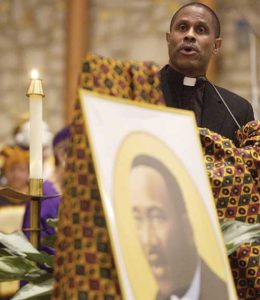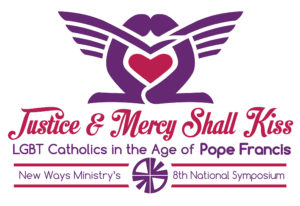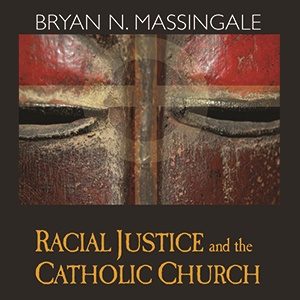Meet Father Bryan Massingale: A Black, Gay, Catholic Priest Fighting for an Inclusive Church
A profile of a progressive leader in the Catholic Church working for racial and LGBTQ justice

Father Bryan Massingale in 2017
The Reverend Bryan Massingale stands at the front of a small conference room on Fordham University’s Rose Hill Campus in the Bronx. He is teaching a course on African American religious ethics and begins the day’s lesson with a question: “What have religious ethicists said about Black love?” It is December 2019 and we are in Duane Library where he teaches. He continues without interruption: “White supremacy impacts the way we love.” Some of the students are quickly typing notes on their laptops, others nodding in approval. Like everyone in attendance, I am enthralled. For almost 20 minutes, he lectures but does not proselytize, and concludes by asking his students to ponder: “How do we have conversations about what it means to love and be loved as Black people? What would it mean to prioritize Black love in the context of Christianity?”
Father Massingale, one of the world’s leading Catholic social ethicists and a prominent African American theologian, has been a professor at Fordham since his arrival from Marquette University in 2016. I visited his class and encountered a space where his students, a majority of whom are white, are able to engage in complicated discussions about race. “I teach classes on sexuality, race, and what I tell my students, especially when talking about race, is that we’re going to have a very honest, open conversation about issues that no one in this room is skilled at talking about,” he tells me after his class ends. “Part of being in American society is we’re not skilled at talking about race in an interracial situation. So, what that means is that we’re going to have to allow each other some freedom here to get it wrong and to maybe say something that could be insensitive and then we can clean it up later, and even though this is going to be a very difficult conversation, I believe that you can do it.”
This approach to teaching is informed by his role as a self-described “scholar activist.” From preaching to teaching to writing, his Catholic faith and commitment to social justice shape his work.
Massingale was born in Milwaukee, Wisconsin, in 1957 to Catholic parents. His father converted to Catholicism in the late 1940s and his mother converted when they married. Both were devoted to pre-Vatican II Catholicism, referring to traditionalist practices like the Latin Mass that took place prior to the Second Vatican Council. He and his four younger siblings went to Catholic grade school; Massingale would go on to attend Catholic high school, college, seminary, and graduate school.
“I saw that there were people who combined the love of God with a concern for social justice, and that was something that was very appealing to me as a young man,” he tells me. “There was just this deep down sense that being a priest would enable me to help people but also be a force for justice, too.”
 From 1979 to 1983, Massingale attended Saint Francis Seminary in Milwaukee, where he was the only African American student. He shared a home with white men who had never lived with a Black person. The first time he remembers any students or faculty addressing racism came during an ethics class when he gave a presentation on “Brothers and Sisters to Us,” the 1979 pastoral letter on racism published by the United States Conference of Catholic Bishops. “Lectures on inculturation didn’t discuss Black or Hispanic Catholic worship, nor did the seminary’s liturgies reflect anything but a white culture aesthetic,” he tells me. He describes this as “cultural erasure,” adding that it sent a clear message: “My cultural background didn’t count and wasn’t valued. It was as if I didn’t exist as a Black man.”
From 1979 to 1983, Massingale attended Saint Francis Seminary in Milwaukee, where he was the only African American student. He shared a home with white men who had never lived with a Black person. The first time he remembers any students or faculty addressing racism came during an ethics class when he gave a presentation on “Brothers and Sisters to Us,” the 1979 pastoral letter on racism published by the United States Conference of Catholic Bishops. “Lectures on inculturation didn’t discuss Black or Hispanic Catholic worship, nor did the seminary’s liturgies reflect anything but a white culture aesthetic,” he tells me. He describes this as “cultural erasure,” adding that it sent a clear message: “My cultural background didn’t count and wasn’t valued. It was as if I didn’t exist as a Black man.”
It was during these four years that he began to deal with questions of his sexual identity and how to unite his faith, race, sexuality, and aspirations for social justice. He reached a turning point in his third year while on a spiritual retreat. Massingale was asked to read from Scripture, and as the group talked about the biblical creation story, he reflected on the lack of Black or gay people in the canon. “I realized at some deep place that I wasn’t even consciously aware of that I didn’t see how God could be imaged as Black or as gay, and certainly not both simultaneously.” While this was devastating for him, it allowed him to begin to reject many of the internalized ideas he had about his own identity and what it meant to be a Black, gay, Catholic man.
“That’s when it first dawned on me: The problem is not from God’s side of the equation. The problem is with the Church.”
A Call to Serve
In 1983, at age 26, Massingale was ordained as a priest at St. John’s Cathedral in Milwaukee.
Prior to his ordination, he had shared that he was gay only with close friends, his spiritual director, and the seminary psychologist. Neither his family nor his archbishop knew; revealing his sexual orientation to his archbishop would have been unthinkable in the early 1980s.
At ordination, he experienced a moment that he describes as the merging of his racial identity, sexuality, faith, and vocation. While lying face down on the ground—a requirement during the ceremony—and praying, he had a moment of radical self acceptance. “I realized that God was calling me. This was not a fluke. This was not an aberration. That God knew who I was and what I was, and called me anyway,” he tells me.
Massingale’s first few years ministering as a priest took place as the AIDS epidemic was claiming the lives of thousands of people. One of the first funerals he remembers performing was for a young man who had died from AIDS complications. He met the man’s parents and they expressed the difficulties of burying a gay son and the shame they felt. Massingale recalls sharing their story months later while speaking at a diocesan event for adults looking to enter the Catholic Church. After his talk, three different families approached him to share that they, too, had gay sons who had lost their lives to AIDS. All three parents had kept their sons’ homosexuality a secret.
Thinking back to those early years of the epidemic, he remembers the fear, uncertainty, and hostility shown toward the gay community. “I don’t think we understood the deep silence, the shameful silence and isolation in which many members of the LGBT community lived in then. That the silence impacted our Church and our Church was complicit in it.”
For nearly four decades, Massingale has challenged the Catholic Church’s treatment of LGBT people, dedicating much of his professional career to calling out the Church’s homophobia. In the early 2000s, when same-sex marriage was still not a legal option in most states, Massingale went against the guidance given by the Wisconsin Catholic Conference of Bishops and argued that a person could support same-sex marriage and still be a good Catholic. Despite preaching about LGBT Catholics for years, that was the first time he made such a public statement.
Last year, during a lecture at the 50th anniversary of DignityUSA in Chicago, a group for LGBT Catholics, Massingale began his talk by declaring: “I come to this conversation as a Black, gay priest and theologian.” Although Massingale came out prior to that lecture, many saw it as a rare yet hopeful moment for the Catholic Church.
The Catechism of the Catholic Church instructs that all gay Catholics are to remain celibate; when a priest is ordained, he vows to remain abstinent and unmarried, regardless of his sexual orientation. In 2005, the Vatican released a document officially stating that while gay men and women are to be treated with respect, they are not allowed to take holy orders because people with “deep-seated homosexual tendencies” are “in a situation that gravely hinders them from relating correctly to men and women.” Three years later, the Vatican also implemented an “evaluation of the candidate’s psychic state” as a way to look for “areas of immaturity,” which included “lack of loyalty; uncertain sexual identity; deep-seated homosexual tendencies.”
The Rev. James Martin, a Jesuit priest and author of Building a Bridge: How the Catholic Church and the LGBT Community Can Enter Into a Relationship of Respect, Compassion, and Sensitivity, tells me that bishops often interpret the Vatican’s teachings about gay priests in a variety of ways. “First, ‘deep-seated’ means anyone who is gay and so they cannot be accepted. Second, it means anyone who is gay but can’t live chastity or celibacy, so that opens it up for many gay men. And third, it means that the identity is the center of their lives, so, for example, someone who had been an activist, could not be accepted.” Martin says that while there are many ordained gay priests living out their vows of chastity and celibacy—many ordained prior to 2005—very few are willing to be as candid as Massingale. “There are more and more gay priests being more open about their sexuality, but a real ‘public’ declaration, like Bryan made, is still rare,” he says, adding that Massingale’s coming out “gave great hope to many LGBT Catholics.”
 In 2018, New Ways Ministry asked Massingale to serve as the director for their annual retreat for gay priests, brothers, and deacons. The organization, founded in 1977, focuses on ministry and advocacy for LGBT Catholics. Frank DeBernardo, the executive director of New Ways Ministry, tells me that a significant part of the organization’s work is to minister not only to LGBTQ churchgoers, but to gay clergy as well. Around twenty to thirty men attend these yearly retreats, many of whom are closeted.
In 2018, New Ways Ministry asked Massingale to serve as the director for their annual retreat for gay priests, brothers, and deacons. The organization, founded in 1977, focuses on ministry and advocacy for LGBT Catholics. Frank DeBernardo, the executive director of New Ways Ministry, tells me that a significant part of the organization’s work is to minister not only to LGBTQ churchgoers, but to gay clergy as well. Around twenty to thirty men attend these yearly retreats, many of whom are closeted.
Once New Ways Ministry announced Massingale as the director of their retreat for gay clergy, Milwaukee’s Archbishop Jerome E. Listecki denounced the event as “not in line with Catholic Church teaching.” Massingale became a target for conservative websites and critics, with many demanding he be censured. Local militias sent death threats to Massingale and the Catholic sisters who were hosting the event at the Sienna Retreat Center, the latter eventually hiring 24-hour security. More than twenty protestors, mostly lay Catholics, showed up at the October 2018 retreat, the first time DeBernardo recalls such a thing happening.
Massingale tells me the retreat was a blessing. Thirty-five men gathered, talked about their identities and relationships with God, and prayed together in a space that allowed them to acknowledge their sexuality. He says the juxtaposition of prayerful Catholics inside the retreat center with protestors outside was jarring and representative of two facets of the Church. “On one hand you have this awesome, holy, sacred, powerful experience of leading people in prayer. Then there are people who gathered to conduct an exorcism because they saw our presence as defiling a sacred space,” he says. “The local bishop spoke out against these priests who were praying, questioning the idea of a gay retreat, but said not a word about the violence and the vitriol to which a group of people who are committed to God’s service are being subjected to. It angers me that people who want to gather to pray are seen as the problem, whereas those who would incite and insult get a pass.”
The Fight For All
Along with pushing for more acceptance of queer Catholics, Massingale is also one of the Church’s fiercest critics on racism. From his writing in National Catholic Reporter on white privilege to his 2017 talk at the Ignatian Family Teach In for Justice, Massingale is committed to challenging how white Catholics and Church leaders view faith through a white lens. “For most of our bishops, they don’t have sustained interactions with persons of color who can acquaint them with the basic facts of life and reality,” he says. “On some level, they don’t want to articulate that we live in a world that privileges white lives because if they face that reality, then they’re called to change. I think that’s something that people don’t want to do.”
In 2010, he published Racial Justice and the Catholic Church, an examination of racism in America from the Civil War to the election of Barack Obama. “I was trying to create a book that would account for undeniable racial progress on one hand, and yet also the deep intransigence and persistence of racism and white supremacy on the other,” he says. The book features a timeline of the Church’s teaching on race, including statements released by the U.S. bishops, and concludes with ways the Church can fight for racial justice.
 Ten years since the publication of Racial Justice, at a time when the Church and country seem more polarized than ever, and when the election of Donald Trump has shattered the post-racial illusion many in the Catholic Church held dear, Massingale believes his book is even more urgent. “America has always understood itself as a white Christian nation, but it is no longer a white, Christian nation. That identity is being shaken,” Massingale insists. “Many white Christians are anxious about it. This is where Catholic faith can make a contribution and say, ‘None of the human ways we understand ourselves really matter because deep down, we are all fundamentally children of God.’”
Ten years since the publication of Racial Justice, at a time when the Church and country seem more polarized than ever, and when the election of Donald Trump has shattered the post-racial illusion many in the Catholic Church held dear, Massingale believes his book is even more urgent. “America has always understood itself as a white Christian nation, but it is no longer a white, Christian nation. That identity is being shaken,” Massingale insists. “Many white Christians are anxious about it. This is where Catholic faith can make a contribution and say, ‘None of the human ways we understand ourselves really matter because deep down, we are all fundamentally children of God.’”
Part of Massingale’s power is his ability to do what many in the Church find too frightening: publicly rebuke bishops for their treatment of marginalized communities.
Matthew J. Cressler, an assistant professor of Religious Studies at the College of Charleston and author of Authentically Black and Truly Catholic: The Rise of Black Catholicism in the Great Migration, says, “The gift Massingale gives us is his insistence that we see the Church as it truly is and, in so doing, that we be given the chance to transform it.” The Rev. Mario Powell, a Jesuit priest who serves with Massingale at St. Charles Borromeo in Harlem, adds that Massingale brings a uniquely prophetic voice to the pulpit. “Bryan would kill me if I call him a prophet—but what is the role of someone who is attempting to be prophetic? It’s to challenge the powers that be and it is to push against the dominant cultural tropes that are out there—that’s what he does.”
Anthea Butler, associate professor of Religion and Africana Studies at the University of Pennsylvania, adds, “It has been difficult in Catholic theological circles for African Americans to gain a foothold, but Massingale’s work has opened the door for many of us who have grown weary in engaging the American Church on the issues of race and racism.”
I met with Massingale several times over the course of a month and saw why so many people have called him a prophet. From making theology accessible to shining a light on the marginalization of Black people in America, Massingale is committed to making the Church he loves a more equitable place for all.
“I’m a Catholic. This is a tradition that nurtures me and supports me, but I’m also very upfront about the fact that I’m not going to apologize for its weaknesses and its failures,” he says during our last meeting. “My whole ministry, in some way, has been to help the Church catch up to God, to help the Church understand that God has already gifted people of color with dignity and value and worth, and God has already gifted LGBT people with dignity, value, and worth.”
Olga Marina Segura is a freelance writer living in The Bronx, N.Y. Her writing has appeared in Sojourners, Refinery29, National Catholic Reporter, ZORA Magazine and the Guardian. Olga is currently working on a book on the Black Lives Matter movement and the Catholic Church that will be published in Spring 2021.